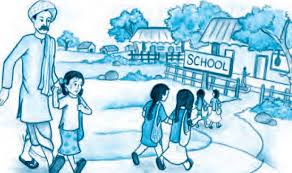Walt Whitman as a Poet of Democracy
Walt Whitman as a Poet of Democracy
Walt Whitman: Introduction :-
Walt Whitman is the greatest poet of America. He is the man who revolutionized American thoughts and poetry. He invented a whole new poetic form and opened up the topic to such a wide range that nobody else had touched. He was a volatile editor and writer. He had strong concerns about women property rights, immigration and the major issues of the day such as slavery.Walt Whitman : A poet of Democracy :-
Whitman was a representative poet of America. For him all Americans are equal irrespective of their race, colour, caste, religion or sex. His works assert the worth of common people. He takes pride in celebrating the self and perceives this 'self' in common with american people. In his I celebrate myself he writes :-
These lines represent his affiliation with the comman men and down to earth approach. For him the genius of America lay in the common people.
His Song of Myself is replete with unforgettable panoramic pictures of American people and remarkable scenery. In this poem by singing for himself he sings for all, for he does not differentiate himself from other and takes pride in possessing many things in common with the average Americans.
His democracy is rooted in the inherent worth and dignity of the common people. He mentions a number of occupations and professions such as that of the pilot, the carpenter, the duck-shooter, the spinning girl etc. and for him all are equally honourable. His democracy is based on the ideals of liberty of individual, fraternity, brotherhood and equality. He sings of breaking off from the old dead traditions and conventions and emphasises on the need to be free and self reliant.
For Whitman democracy is not merely a political dogma, his approach to democracy is different. For him democracy is not just the political liberty and freedom but a possibility of universal peace and justice, brotherhood, tolerance and end of impediments to personal development. He talks of universal brotherhood as is evident from these lines of his Song of myself :-
"And that all the man ever born are also my brothers,
And the women my sisters and lovers."
Whitman also finds nature for his conception of democracy. He draws many symbols from nature such as grass, lilacs, hermit thrush etc. Almost his every poems such as When lilacs last in the dooryard bloome'd, O Captain! My Captain!, Crossing Brooklyn Ferry are excellent examples of use of symbolism. He presents lilacs as a symbol of love for ideal political leader. In his O Captain! My Captain! the whole nation of America is symbolised as a ship, which in turn suggests his approach for nationalism and democracy.
Thus Whitman, a prophet of democracy, is very practical and pragmatic in his approach. His Leaves of Grass is an unmatched work, establishing him not only as a great democratic poet of America but of the whole world. He takes different path for his idea of democracy which is universalistic and all inclusive.
READ MORE :-
- Aurobindo Ghosh as a Poet.
- Discuss various Themes of Geetanjali.
- Theme of Savitri.
- Robert Frost as a poet of Nature.
- Tagore as a poet.
- Yank as a tragic hero/ Character Sketch of Yank.
- Discuss Walt Whitman as a poet of Democracy

.jpeg)

.jpeg)
.jpeg)

.jpeg)




Comments
Post a Comment
Your Views and Comments means a lot to us.